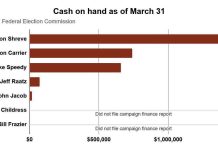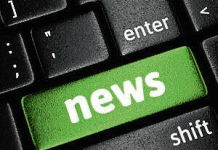Columbus native John Brown had just awakened early Saturday when he saw an email notifying him that his former boss and long-time mentor and friend, President George H.W. Bush, had died.
Brown, a 1977 Columbus North High School graduate, was hired by then-Vice President Bush in 1982 to work on the presidential advance staff, a job that took Brown and Bush on journeys together all over the world. Brown was a few years out of Ball State University when the offer was made, and he jumped at the chance to work for Bush.
As Brown watched Bush’s state funeral at the National Cathedral in Washington, D.C., on television Wednesday from his office in North Carolina, he remembered Bush as a man who never wanted the pomp and circumstance of high political office.
Instead, Bush enjoyed the chance to meet Americans and talk with them about their lives and how he could help them, Brown said.
[sc:text-divider text-divider-title=”Story continues below gallery” ]Click here to purchase photos from this gallery
While Bush held the most powerful position in the world — “at the end of the day, he literally was like ‘This is about you and me,’ “ Brown said. “That’s what made him so special.”
Funeral plans
What many people don’t realize is that upon taking office, a U.S. president begins the process of laying out his own state funeral, Brown said.
“Every president does it so if something would happen, they would know what to do. His (George H.W. Bush) documents have been around for a long time,” Brown said.
For example, they state that Bush did not want the traditional “Hail to the Chief” played during his funeral, Brown said.
“He thought of himself as a common person. He would say, ‘I came into this world like everyone else, I want to go out of this world like everyone else,’ “ Brown said.
And although Brown was invited to the private funeral that will follow today in Houston, Texas, at the Bush family’s Episcopal home church, Brown said he was not planning to attend.
“I’m comfortable with having served him and where it all is in my life. I know he would tell me ‘It’s OK,’ “ Brown said.
Mentors
Brown, who is executive director of Carolina’s Independent Automobile Dealer’s Association in North Carolina, described himself as a small-town kid from Columbus who was fortunate to be in the right place at the right time — to be able to work for Bush and to have him be among the mentors in his life.
Another of Brown’s mentors was the late Jim Baker, the Arvin Industries president who died in 2013.
“They both taught me about life,” Brown said. “It wasn’t about how to be successful in politics or business. It was always about how to be a successful person.”
Brown was able to bring the two together after Baker had mentioned how much he wanted to play a game of horseshoes with President Bush.
“So we made that happen,” Brown said, laughing a little at the memory.
“We had Mr. Baker up there at Camp David pitching horseshoes with the president. He (Bush) was a common guy who did extraordinary things,” Brown said.
Bush would continue to ask Brown about Baker and other people connected to Brown over the years, something the former president excelled at — remembering the connections between people.
Brown speculated those skills were learned in the way he had been raised.
Bush memories
“He understood how to bring people together to find agreement, and how to agree to disagree on other things,” Brown said. “He used his skills as a diplomat to move people toward understanding.”
One example of that mindset was Bush’s speech before the Republican National Convention and his famous line, “Read my lips, no new taxes,” Brown said.
“He stood before all of us at the convention, and that line helped propel him to the presidency,” Brown said. “But there came a time the majority of Congress felt they wanted to raise taxes, and he felt, in order to move the country forward, that’s what he had to do. He fully realized what he had said at the convention, but he came back to what was best for the country, not just Republicans. And in agreeing to go along with the tax increase, he paid the price.”
Bush made that decision because it was the only way to move the country forward, Brown said.
On one nonstop 15-hour trip that Brown made with the Bush family from Hong Kong back to the United States, George and Barbara Bush and their Secret Service escorts were in the first-class section, but decided they wanted to go to the back of the plane and greet people during the long flight.
“He and Mrs. Bush walked through the aisles, shaking people’s hands, saying hello to those people. They had no clue that a former president was on board,” Brown said.
It didn’t matter if Bush was in office or out of office, he was always putting others first, Brown said.
“It was always, ‘Tell me about how I can help you. What’s going on in your life? What’s next for you?’” Brown said. “Everyone would tell you he was very approachable. When we did advance work on trips for him, he was always the first to stop and thank the police officers who were directing traffic. If someone one wanted a picture, he would always stop.”
“That’s just the kind of person he was,” Brown said. “He was always so thankful for the relationships and the people he met. Most people would think when meeting him that they were having the experience of a lifetime to meet a president. But for him, he thought of it as his opportunity to meet somebody new, whether it was a trip to Fort Wayne or looking up an old buddy from the past.”
Brown considers “41” as the most qualified president to be elected, based on his public service as a diplomat, leading the CIA, a member of Congress, a successful businessman and a vice president.
On every trip they took, no matter the significance — he could have been visiting the president of Egypt or someone’s home — he always took the time to say ‘thank you,’ “ Brown said. “He made you feel that you were the most important thing to happen to him at that moment.”
And while Bush was known for his down-to-earth interactions, he wasn’t above having a little fun while in office, too.
Broccoli brouhaha
Brown remembered the support from kids all over America when he declared as president that he no longer planned to eat broccoli.
“I do not like broccoli,” Bush once said to the press in 1990, with a hint that he was kidding. “And I haven’t liked it since I was a little kid and my mother made me eat it. And I’m president of the United States, and I’m not going to eat any more broccoli!”
Bush did not relent when broccoli growers sent him a 10-ton shipment of the vegetable.
The broccoli comment was a hit with Brown’s son Will, who first met Bush when the Columbus family took a trip to Washington and Bush invited them to the Oval Office. As a first-grader, Will got to play with springer spaniel Millie in the Oval Office, and later had to have his parents vouch for him when he told classmates that he had met the president and played with Millie.
The younger Brown and the president crossed paths again when Will was a Parkside middle-schooler, and Bush had come to Indianapolis for a visit — and the two had a picture taken together.
Years earlier, Bush had been told of the boy’s pending birth during a 1984 White House Christmas party, when the Browns announced they were expecting — and Will arrived the next April. A photograph captured the moment.
Will Brown, now working in Washington, D.C., on the government relations team for the U.S. Travel Association, said his first memory of learning about his family’s link to the president was a photo in the basement of the Columbus family home showing his father and Bush riding camels in Egypt. He remembers asking his father about the storybook animals in the photo.
He also distinctly remembers the field trip to Indianapolis in which he and several of his middle school buddies were allowed to briefly leave the group and walk into a room filled with Secret Service agents to meet the president.
“I remember him as being very kind and very funny,” Will Brown said. “He asked us all our names and what we wanted to do and then we played a trivia game to win the presidential tie clip,” he said.
Disappointed, Brown said a classmate won the clip instead of him.
At 10:39 a.m. Tuesday, Will Brown sent his father a text.
“In line to see Bush 41,” Will wrote as he waited to walk past Bush’s casket at the Capitol rotunda, something his father said moved him to tears.
“It was sort of a spur-of-the-moment thing. I have a job that takes me into the Capital quite a bit. I knew how much President Bush had meant to my father,” Will said. “I just wanted to share that moment and honor what was a very honorable and principled man.”
“Our entire family extends our condolences to the Bush family,” John Brown said Wednesday. “He was like a father to me and I feel as though I’ve lost a member of my family. He’s someone I cared deeply about.”
He also mentioned another example of Bush’s thoughtfulness and dedication to service — the instructions for what was to happen to “Sully,” a service dog Bush received after the death of his wife.
“He made sure that his service dog goes on to help people (Walter Reed Hospital in Washington) now that he has passed away,”John Brown said. “That is so George Bush. It doesn’t have to end with his death. That’s something for all of us to remember.”
[sc:pullout-title pullout-title=”Pull Quote” ][sc:pullout-text-begin]
"He was like a father to me and I feel as though I’ve lost a member of my family."
— Columbus native John Brown on George H.W. Bush
[sc:pullout-text-end]




